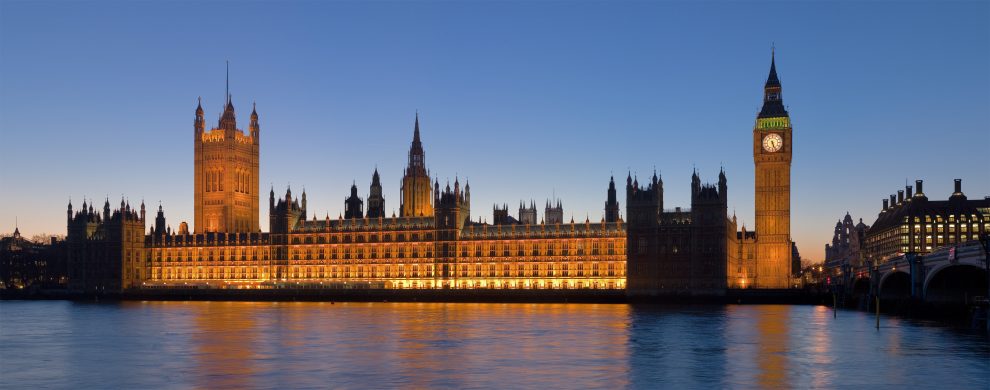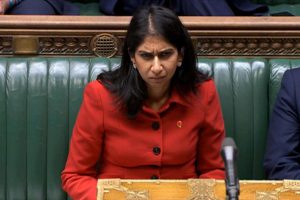UGLY scuffles greeted Tuesday morning’s prorogation of Parliament, shutting down debate on Brexit until 14th October. But even as the House of Commons went dark, two legal cases aimed at thwarting the prorogation were travelling in tandem through courts either side of Hadrian’s Wall.
In Scotland, a group of 79 claimants, led by Scottish MP Joanna Cherry QC, sought a ruling that the prorogation was unlawful because it was done (obvs) with the ulterior purpose of preventing Parliament from scrutinising the executive.
The England ’n’ Wales counterpart litigation was started by the Brexiters’ Great Satan, Gina Miller, and supported by interventions from Shami Chakrabarti, the Welsh and Scottish devolved Governments, and Sir John Major.
Proroguing Parliament is a power exercised directly by the Queen, theoretically on advice from the Privy Council but in practice from her Prime Minister. As such, it forms part of the uncodified exercises of executive power known collectively as the Royal Prerogative.
Historically, it was thought that the courts had no role in supervising any exercise of the Royal Prerogative. That presumption was partly overturned in 1985 when the House of Lords ruled that some, but far from all such actions could be subject to judicial review. The determining factor is not whether or not a decision it is an exercise of prerogative power, but its subject matter: does it touch on exclusively political business, particularly matters of ‘high policy’?
Looking at Boris’ decision to prorogue Parliament, the two courts reached opposed conclusions. In Edinburgh’s Inner House of the Court of Session, Lord Drummond Young pushed hard at the legal boundaries of justiciability of exercises of the Royal Prerogative, ruling that the courts can ‘decide whether any power, under the prerogative or otherwise, has been legally exercised’. It was up to the Government to prove they had valid reasons for the prorogation, ‘having regard to the fundamental constitutional importance of parliamentary scrutiny of executive action’.
Having concluded that it could interfere with the decision to prorogue, the court went on to do so. Unambiguously, unanimously, and expressing itself in terms you don’t normally find in dry decisions on constitutional law. The court gave Boris the mother and father of a kicking. This was ‘an egregious case of a clear failure to comply with generally accepted standards of behaviour of public authorities’. The purpose of prorogation was ‘to prevent or impede Parliament holding the executive to account…and to allow the executive to pursue a policy of a no deal Brexit without further Parliamentary interference’.
Down in London, a Divisional Court headed by the Lord Chief Justice couldn’t agree less. It strongly disagreed that ‘the jurisprudential stage has now been reached where there is no longer any exercise of common law prerogative powers which is immune from judicial review’. The court rejected Lord Pannick’s submissions (on behalf of Ms Miller) that this prorogation offended against a developing doctrine of Parliamentary sovereignty. It held that there were no legal standards against which Boris’ motives could be judged as improper, that this was all ‘high policy’ anyway, and that the Court had no jurisdiction whatsoever to review the decision.
Of the two courts, the Scottish Inner House is nominally the senior. It ruled that ‘the Prime Minister’s advice to HM the Queen and the prorogation which followed thereon was unlawful and is thus null and of no effect’. The Government did not ask the court to suspend this ruling pending appeal. As a result, Parliament is not and never was prorogued.
Both judgments are now the subject of conjoined appeals to the Supreme Court, which will hear the cases next Tuesday. This didn’t stop Boris in the meantime setting the attack dogs on the out-of-touch, elitist, enemy-of-the-people, bewigged Scottish Remainer gits. The Daily Mail exclusively revealed the disgraceful truth that one of their Lordships likes holidaying in France and that another has a morally contemptible taste for what Hitler would have termed Entartete Musik, namely jazz.
Cabinet Minister Kwasi Kwarteng piped up to have his crack at the beaks. He told the BBC that “many people are saying – I’m not saying this – but, many people are saying that the judges are biased. The judges are getting involved in politics”. He omitted the necessary qualification that the people saying this, many or otherwise, are chumps with a Barbary ape’s understanding of the constitutional position of the judiciary and the importance of the rule of law.
Part of Boris’ motive behind prorogation was, as the Scottish court found, to stymie the executive and avoid scrutiny. But it was more to force Parliament’s hand and to send Jeremy Corbyn charging, trumpeting, into the elephant trap of an early General Election. That part of the plan failed, for now. As things stand, the opposition has Boris boxed in. He can’t get a majority for an election, and Parliament lacks the courage and unity of purpose to do anything meaningful to stop Brexit.
Labour’s Parliamentary party is as divided as ever between an enormous Remain majority on one side, and the Lenin-capped loon and his grisly leadership team on the other. For them the EU is a bosses’ club designed to prevent the sort of Real Socialism that worked so well in the DDR, Venezuela etc. etc. Corbyn would not be even slightly disappointed if his prevarication on Brexit forced the UK off the no-deal cliff; he would blame the ensuing chaos on the Tories and stand a good chance of winning an election off the back of it.
If the Supreme Court sides with the Scots on Tuesday, what practical effect might that have? What is the purpose of Parliament sitting at all if MPs have nothing useful to do?
Parliament exists to legislate, not to block the executive. With a minority Government in office but not power, an election this Autumn is a virtual certainty, whether before or after 31st October. It is far from certain that this alone will persuade the EU 27 to grant the Article 50 extension Parliament has ordered Boris to seek, because If Boris wins a decent majority, Brexit, on whatever terms, will happen.
The current chicanery in Parliament is making no deal more, not less likely. There is a clear Remain majority in Parliament. They should use that majority to stop Brexit, rather than playing party political games aimed at damaging the Prime Minister’s credibility with Leave voters. If the Supreme Court allows Gina Miller’s appeal, MPs who oppose Brexit should defy both Boris and Corbyn, and move swiftly to legislate for a confirmatory referendum. Otherwise, trusting the voters means letting Boris have his election, now.


















Add Comment